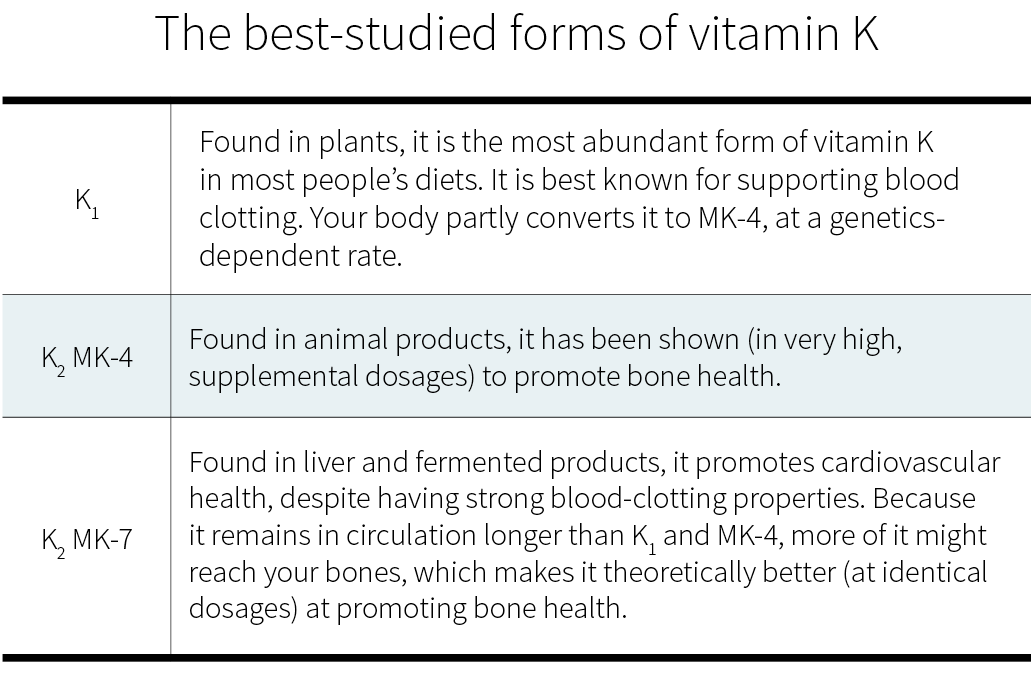What are the Functions, Health Benefits, RDI and Sources and Toxicity of Vitamin K [SCIENCE EXPLAINED]
Vitamin K is an essential vitamin mainly found in plants or produced from intestinal bacteria. It plays an many functions in bone health and regulates blood clotting.
It is one of the four fat-soluble vitamins, along with vitamin A, Vitamin D, and vitamin E.
Vitamin K was first discovered in In 1929 by scientist Henrik Dam. He discovered a compound that played a role in coagulation (blood clotting). He called this compound Koagulationsvitamin, which lately known as vitamin K.
It was named vitamin K after the German word koagulation, because vitamin K’s role in blood coagulation was first discovered in Germany.
Vitamin K can be found in dark green vegetables, matcha tea and natto (fermented soybeans).
Vitamin K2 can also be found in animal products, since it is a result of bacterial fermentation.
Vitamin K is an essential fat-soluble vitamin mainly found in plants and also produced by bacterial fermentation in animals. It was first discovered in 1929 by Henric Dam, He first named it Koagulation vitamin which lately known as vitamin K.
FUNCTIONS OF VITAMIN K?
Vitamin K is very important for your overall health.
Vitamin K deficiency is very rare in healthy, well-fed adults. It is mostly a concern in newborns.
Vitamin K is abundant in a balanced diet, and the bacteria in your colon can also produce some.
Current evidence suggests that, through their effect on calcium regulation, some forms of vitamin K can help prevent osteoporosis and cardiovascular diseases.
Vitamin K may have a role to play in cancer therapy and anti-aging treatments.
It may also help with regulating insulin sensitivity and reducing skin reddening, but more research is needed to determine if vitamin K has an active role to play in these areas.

Vitamin K also helps in removing Calcium ions from the blood stream, which prevents buildup in the arteries.
Research has shown that vitamin K is an anticalcification, anticancer, bone-forming and insulin-sensitising molecule. Recent data indicate that subclinical vitamin K deficiency is not uncommon.
Vitamin K participates in some very important biological processes, notably the carboxylation of calcium-binding proteins, In which Vitamin K partakes in blood clotting but also in calcium regulation.
This helps ensure that more calcium gets deposited in bones and less in soft tissues, thus strengthening bones and reducing arterial stiffness.
Vitamin k is deficiency is rare in adults but very common in newborn babies. Vitamin K plays important role in our body including calcium regulation which helps in preventing osteoporosis, heart diseases and also helps in strengthening bones as well.
Vitamin K Names (Types)
Vitamin K exists naturally as vitamin K1 (phylloquinone) and vitamin K2 (menaquinone, MK-4 to MK-10).
Both Vitamin K1 and vitamin K2 are required for the γ-glutamyl carboxylation(helps in synthesis of vitamin K) of all vitamin K-dependent proteins.
Vitamin K is a family of fat-soluble vitamins. Vitamin K1 and Vitamin K2 are the natural forms, are safe even in high doses.
Vitamin K1
There is only one type of Vitamin K1; and it is found in plants, notably green leafy vegetables and your body can use it directly or convert it to Vitamin K2 (MK-4).
Vitamin K1, also known as phylloquinone is mainly found in green leafy vegetables as well as olive oil and soyabean oil.
So Vitamin K1 is produced in plants, where it is involved in photosynthesis, the greener the plant, the greater its chlorophyll content.
The greater its chlorophyll content, the greater its K1 content. When it comes to foods, Vitamin K1 is especially abundant in green leafy vegetables.

But there is only one one issue with Vitamin K1. Unfortunately, Vitamin K1 is tightly bound to chloroplasts (organelles that contain chlorophyll and conduct photosynthesis), so you could be absorbing very little of what you eat — maybe less than 10%.
Since vitamin K is a fat-soluble vitamin,So, its absorption can be enhanced by the co-ingestion of fat. It means if you add fats(oils) to cook spinach(high in vitamin K1) It can raise Vitamin K1 bioavailability(rate of absorption) from 5% to 13%.
Vitamin k1 also known as phylloquinone, only produced and found in plants. The more greener the plant is, the more its Vitamin k1 content. Vitamin K1 has a very little rate of absorption, it can be increased by adding some oil during cooking buy only by 10-12%.
Vitamin K2
Vitamin K2 (menaquinone) is found in animals, small amounts in chicken, butter, egg yolks, cheese and fermented soyabeans (better known as natto).
There are several forms of vitamin K2.
Vitamin K2 can be further divided into several different sub-types, the most important ones being MK-4 and MK-7.

Vitamin K1 is directly active in your system, your body can also convert it to Vitamin K2 (MK-4). How much gets converted depends notably on your genetic heritage.
Despite the fact that mammalian bacterial intestinal(human intestine) flora are able to produce vitamin K2, the amount produced is thought to be negligible.
As we know, Vitamin k2 (MK-4) is present in animal products (meat, eggs, and dairy), though only in small quantities.
Because those foods usually contain fat, dietary vitamin k2 (MK-4 )should be better absorbed than dietary vitamin K1.
Other than MK-4, all forms of Vitamin K2 are produced by bacteria.
Vitamin K is mostly produced in the colon(large intestine), where there are no bile salts to facilitate its absorption, so the actual ratio of absorption of vitamin k2 is probably much lower.
Bacteria-produced Vitamin K2 can be found in fermented foods, such as cheese and curds, but also in liver meat.

The richest dietary source of Vitamin K2 is natto (fermented soybeans), which contains mostly Vitamin k2 (MK-7). As it stands, Vitamin K2 (MK-7) is the only form of Vitamin K2 that can be consumed in supplemental doses through food (i.e., natto). For that reason, MK-7 is the most-studied form of K2, together with MK-4.
Vitamin K2 also known as menaquinone are found in animal products. Vitamin K2 are of mainly two types i.e. MK-4 and MK-7. Vitamin K is produced by bacteria in colon. In large intestine there in no bile salt to help them in absorption that is why bioavalability of Vitamin K is quite less. Some sources of Vitamin K2 is curd, cheese and natto.
Vitamin K3
Vitamin K1 and Vitamin K2 are the only natural forms of vitamin K, but there exist several synthetic forms, the best known of which is Vitamin K3.
However, whereas the natural forms of vitamin K are safe, even in high doses, But Vitamin K3 can interfere with glutathione ( type of antioxidant).
Vitamin K3 was once used to treat vitamin K deficiency in infants, but it caused liver toxicity, jaundice, and hemolytic anemia.

Nowadays, Vitamin K3 is used only in animal feed, in small doses. In animals, Vitamin K3 gets converted into Vitamin K2 (MK-4), which you can consume safely.
Vitamin k3 is a synthetic form of Vitamin K. Natural forms like Vitamin K1 and Vitamin K2 are safe in high doses but Vitamin K3 can cause liver toxicity and jaundice. Once Vitamin K3 is used to prevent Deficiency in infants, now it is used to feed animals as it will convert it into Vitamin K2 (MK-4) to be consumed by animals.
Health BENEFITS OF VITAMIN K?
What complicates matters is that each vitamin has different forms, called vitamers, each of which may affect you differently.
Vitamin K has natural vitamers, Vitamin K1 (phylloquinone) and Vitamin K2 (menaquinone), and synthetic vitamers, the best-known of which is Vitamin K3 (menadione).
Bone Health
Studies suggest that Vitamin k plays a very Important role for bone health and prevents osteoporosis.
Vitamin K partakes in calcium regulation and it helps ensure that less calcium gets deposited in soft tissues and more in bones, thus strengthening the latter.
Current evidence suggests that supplementing with vitamin K with certain forms can benefit bone health, especially in the elderly (who have lower levels of circulating Vitamin K2).

Vitamin K2 (MK-7) appears to support the carboxylation of osteocalcin (a major calcium-binding protein in bones) more efficiently than Vitamin K1.
Clinical trials suggest that, for the purpose of increasing bone density, Vitamin K2 (MK-4) and (MK-7) work more reliably than Vitamin K1.
Vitamin K partakes in calcium regulation which result in strengthening of bones. Vitamin K2 appears more beneficial that Vitamin K1
Reduces Fracture Risks
More significantly, a meta-analysis of Vitamin K2(MK-4) trials found an overall decrease in fracture risk.
The effect of Vitamin K1 or MK-7 supplementation on fracture risk is less clear.
Only few studies reported a decrease in risk of fractures with supplementing Vitamin K1, but without a concomitant increase in bone mineral density.
More research on vitamin K and fracture risk will be needed to clarify the effects of the different forms at different dosages.

Currently, if you wish to supplement for bone health, a very high dose of MK-4 (45,000 mcg) is the option best supported by human studies. Those studies focused on the prevention of bone fractures.
In a 12-month study, 20 patients suffering from a chronic kidney disorder were given a daily glucocorticoid (a corticosteroid that has for side effect to decrease bone formation and increase bone resorption).
In addition, half the patients received 15 mg of MK-4 daily, while the other half received a placebo. The placebo group experienced bone-density loss (BDL) in the lumbar spine, while the MK-4 group did not.
There appears to be a relative increase in bone mineral density associated with vitamin K supplementation, due to attenuating the rate of bone loss in older individuals. Most of the benefits have seen when Vitamin K is supplemented along with vitamin D.
Vitamin K can reduce the fracture risks by reducing the rate of bone mineral density loss in older individuals. The effect of Vitamin K1 and Vitamin K2(MK-7) is less clear, Most probably Vitamin K2(MK-4) will help.
Vitamin K for Cardiovascular Health
Vitamin K is a multifunctional micronutrient implicated in age-related diseases such as cardiovascular diseases.
Vitamin K involvement as a protective super-micronutrient in aging potential of vitamin K supplementation as a health benefit.
As we knew, vitamin K partakes in calcium regulation and it helps ensure that more calcium gets deposited in bones and less in soft tissues, thus reducing arterial stiffness.
Clinical trials on supplemental vitamin K have focused on Vitamin K1 and Vitamin K2(MK-7).
Epidemiological studies and mechanistic evidence suggest that dietary Vitamin k2 benefits cardiovascular health more than an equal dose of dietary Vitamin K1.

Often, those trials used a combination of vitamin D and other nutrients, but with vitamin K being the key difference between the intervention group and the control groups.
Evidences concluded that Vitamin K supplementation (including both K1 and K2) improves surrogate measures of cardiovascular disease including artery and valve calcification and artery stiffening.
Both of these forms of vitamin K seem to cause a consistent reduction in arterial stiffness (with better evidence for MK-7). Judging from those trials and the epidemiological evidence, Vitamin K2(MK-7) seems the better choice.
Cross-sectional and cohort studies show that high vitamin K status is associated with reduced coronary artery calcification, Cardiovascular diseases and mortality risk.
Vitamin K plays a important role in maintaining heart health as it reduces the arterial stiffness. Vitamin K2 benefit heart health more than Vitamin K1.
Blood Clotting
Vitamin K deficiency impairs blood clotting, causing excessive bleeding and bruising.
It is rare in adults, but more common in newborns (more than 4 cases per 100,000 births in the UK), where it can result in life-threatening bleeding within the skull.
American Academy of Pediatrics recommends that newborns receive Vitamin K1 shortly after birth.

If you suffer from hypercoagulation (if your blood clots too easily), you might be prescribed a vitamin K antagonist (VKA), such as warfarin, a medication that hinders the recycling of vitamin K.
There is some evidence that Vitamin K1 enhances coagulation more than does Vitamin K2(MK-4) but less than does MK-7.
Daily supplementation, 100 mcg of Vitamin K1 is considered safe, but in some people 10 mcg of MK-7 is enough to significantly impair VKA therapy.
Remember that natto is rich in MK-7. A single serving of natto can increase blood clotting for up to four days.
Human studies saw no increase in blood-clot risk even from 45 mg (45,000 mcg) of MK-4 taken once or even thrice daily.
Vitamin K's main function is blood clotting, Studies suggest taking 100mcg of Vitamin K1 can help. Vitamin K1 enhances coagulation more than does Vitamin K2(MK-4) but less than does MK-7.
Cancer
A pilot study noted that recurrence rates in the group given 45mg MK-4 daily were 12.5% at 12 months, 39.0% at 24 months, and 64.3% at 36 months which significantly outperformed control. The survival rates showed a very strong trend to be improved, but failed to reach statistical significance.
Although the studies have used superloading of vitamin K 40mg (40000mcg) and only in hepatic cancers, the reduction in mortality risk and prolongation of survival times appears to be quite notable.
Vitamin K2 has been shown to inhibit the growth of human cancer cell lines, as well as to treat myelodysplastic syndrome.

Two trials seem to indicate that vitamin K2 45 mg/day reduces the development of hepatocellular carcinoma (HCC) in patients with liver cirrhosis.
Vitamin K2 significantly reduces the recurrence of HCC in patients following the curative treatment of HCC with an associated reduction in all-cause mortality in these patients.
Vitamin K2 45 mg once daily is less expensive, orally administered and safe, as it is currently used for the treatment of osteoporosis.
In these trials, there were few if any adverse events associated with vitamin K2 45 mg once daily, even out to approximately 8 years of duration.
Vitamin K have potential effects in preventing cancer. studies shows that Vitamin K2 inhibit the human cancer cells and reduces the development of hepatocellular carcinoma. Consumin 45 mg of Vitamin K2 may help and doesn't have any potential side-effects.
Is Vitamin K Good for Diabetes?
Insulin Sensitivity
In a 3-year randomised, double-blind, controlled trial of 355 patients, vitamin K significantly improved insulin sensitivity in men with diabetes.
An improvement of insulin sensitivity has been noted with 30mg of Vitamin K2(MK-4) supplementation over 4 weeks in healthy individuals.

Vitamin K is involved in insulin sensitivity, production of adiponectin and increased glucose tolerance, all of which may have contributed to these results. In short vitamin K may improve insulin sensitivity in men with diabetes.
Studies suggest that diabetic patients who were supplementing Vitamin K, resulted in Improved Insulin Sensitivity. Evidence shows that taking 30 mg of vitamin K2 can help.
Improved Insulin
The spike in insulin following an oral glucose tolerance test appeared to be greater in those relatively deficiency in vitamin K.
Individuals who consumed 90 mg of Vitamin K2 (MK-4) for a week did not experience any significant effects.
A relative deficiency of vitamin K seems to be associated with higher post-meal insulin spikes (over 120 minutes), and this abnormal elevation is normalized upon supplementation of vitamin K.
The spike in insulin in seen with those who were deficient in vitamin k but not in Individuals who were taking 90 mg of Vitamin K2. Vitamin K may help in improving Insulin spikes.
VITAMIN K RDI?
The Recommended Daily Intake (RDI) of vitamin K is sufficient to support healthy blood coagulation.
No one knows. There is, as yet, not enough evidence to set a Recommended Dietary Allowance (RDA) for vitamin K, so an Adequate Intake (AI) has been established at a level assumed to prevent excessive bleeding or help in blood clotting.
The Adequate Intake (AI) for vitamin K has been proposed to be 90 mcg/day(micrograms) for women and 120 µg/day for men.
However, it has been speculated that the AI for vitamin K (90–120 µg/day) is not sufficient to induce complete carboxylation(process responsible of synthesis of vitamin K) of all vitamin K-dependent proteins.

Higher levels of vitamin K provide Health benefits for cardiovascular and bone health. Unfortunately, it is difficult to obtain high levels of vitamin K from food alone.
In the United States, the AI for vitamin K is 120 mcg/day for men and 90 mcg/day for women. In Europe, the AI for vitamin K is 70 mcg/day for men and women. More recent research, however, suggests that those numbers should be increased.
Most people don’t like natto(fermented soyabean) enough to eat 50 grams a day, so supplementation of vitamin K is a popular option.
Optimal levels of vitamin K are associated with improved bone circumference and diameter. Vitamin K can also protect cardiovascular health. It reduces the calcification and stiffening of arteries, which reduces the risk of cardiovascular-related mortality.
Vitamin K is often supplemented alongside vitamin D, since vitamin D also supports bone health. In fact, taking both together will improve the effects of each, since they are known to work synergistically.
There is no as such RDI set for Vitamin K but there is an Adequate Intake(AI) is established by studies. The adequate intake (AI) for vitamin K has been proposed to be 90 mcg/day(micrograms) for women and 120 µg/day for men. But research shows that this number should be increased as Higher levels of vitamin K provide Health benefits for cardiovascular and bone health. Taking both Vitamin K and Vitamin D together will improve the effects of each, since they are known to work synergistically.
VITAMIN K OVERDOSE SIDE EFFECTs?
Vitamin K toxicity is extremely rare. The only reported toxicity comes from menadione(Vitamin K3), which has no use in humans.
Its toxicity is thought to be associated with its water-soluble properties. When toxicity does occur, it manifests with signs of jaundice, hemolytic anemia, and kernicterus(type of brain damage) in infants.
Fortunately, No allergic reactions have occurred with vitamin K injections, no incidence of actual toxicity has ever been reported in people taking natural vitamin K, even in high supplemental doses.

For that reason, neither the FDA nor the EFSA has set a Tolerable Upper Intake Level (UL) for vitamin K. One should note, however, that we lack long-term, high-dose studies on vitamin K safety.
The Tolerable Upper Intake Level (UL) is the highest level of daily nutrient intake that is likely to pose no risk of adverse health effects for almost all individuals.
No adverse effects associated with vitamin K consumption from food or supplements have been reported in humans or animals.
Vitamin k toxicity is rare, no adverse side-effects has seen on human if vitamin K taken from foods. But, synthetic forms like Vitamin K3 is associated with some symptoms like jaundice and kernicterus in infants.
Vitamin K tolerable Upper Limit?
Data from animal models have shown no toxicity of vitamin K (NRC, 1987).
No adverse effects were reported with administration of up to 25 g/kg of phylloquinone(Vitamin k1) either parenterally or orally to laboratory animals (Molitor and Robinson, 1940).
The highest intake of dietary vitamin K reported for the U.S. population was 340 μg/day in women aged 19 between 30 years .
The highest intake of vitamin K from supplements was 367 μg/day, also in women aged 19 through 30 years .
Currently, there is no known toxicity is associated with high doses of vitamin K1 or vitamin K2. Therefore, there is no designated upper intake level (UL).
No significantly increased risk was reported for children who had been given oral vitamin K.

Vitamin K2 also does not display any adverse effects when ingested orally. Studies have shown that coagulation studies in humans did not show an increased risk of blood clots when ingesting 45 mg per day of vitamin K2 (as MK-4). Researchers observed this in a patient who took upwards of 135 mg per day (45 mg three times per day).
The synthetic form of Vitamin K, Vitamin K3 is very toxic, and as a result, has been banned from over-the-counter sales in the United States because ingestion could result in allergic reactions, hemolytic anemia, and cause liver damage.
A search of the literature revealed no evidence of toxicity associated with the intake of either the phylloquinone(Vitamin k1) or menaquinone(Vitamin K2) forms of vitamin K. A synthetic form of vitamin K, menadione(Vitamin K3), has been associated with some liver damage in adults.
There is no set Tolerable upper intake of Vitamin K, But consuming 300-400 mcg is safe. Natural forms like Vitamin K2 and Vitamin K1 has not associated with any effects even with high doses. Vitamin K2 can interfare in blood clotting if taken in very high doses like 135000 mcg a day( ultimate high). But, Vitamin K3 is toxic and should avoid by humans.
Vitamin K Sources of Food
Vitamin K deficiency is rare but a minimum requirement of 120 mcg a day is necessary for normal bone development and cardiovascular health.
Around the globe most people are reliable from the phylloquinone(Vitamin K1) for Vitamin K commonly consumed foods are available.
But as we know our body only able to digest 10% of the phylloquinone if we co-ingest with some amount of fats.
Best Sources of Vitamin K1
Green leafy vegetables like collards, spinach, and salad greens contain in excess of 300 μg of phylloquinone in 100 grams.
While broccoli, brussels sprouts, cabbage, and lettuce contain between 100 and 200 μg of phylloquinone in 100 grams.
Other green vegetables contain smaller amounts.

Plant oils and margarine are the second major source of phylloquinone in the diet.
The phylloquinone content of plant oils is variable, with soybean and canola oils containing greater than 100 μg of phylloquinone in 100 grams.
Cottonseed oil and olive oil contain about 50 μg/100 g, and corn oil contains less than 5 μg/100 g. (Poor sources)
Prepared foods contain variable amounts of vitamin K depending on their content of green vegetables and the source and amount of oil used in their preparation.
Spinach, collards, broccoli, and lettuce are the major contributors of vitamin K in the diet of U.S. adults and children.
Green Leafy Vegetables like spinach, collards, lettuce and cabbage are great sources of Vitamin K1. Plants oil like soyabean and canola oils are also good source of Vitamin K1. Recommended to eat leaves with some amount of oil as it wil increase bioavalability.
What Food Have Vitamin K2?
Vitamin K2 (MK-4) can be found in Animal products (meat, eggs, and dairy). The other types of Vitamin K2 like MK-7 can be found in fermented foods and liver meat.
Natto contains a very high amount of Vitamin K2 (MK-7), gives around 900 mcg of menaquinone per 100 grams.
Chicken, Eggs and yolks are also good sources of vitamin K2(MK-4). They provide around 10-60 mcg of Menaquinone-4 per 100 grams.
Forms of Vitamin K2 other than MK-4 and MK-7 have not been well studied but are likely to have some benefit — cheeses and beef liver are notable sources of others forms of Vitamin K2.
Fortunately, A high dietary intake of Vitamin K2 (≥33 mcg/day seems optimal) may reduce the risk of coronary heart disease — an effect a high dietary intake of Vitamin K1 doesn’t appear to have.
It doesn’t mean that foods rich in Vitamin K1 are valueless: dietary Vitamin K1 intake will protect you from excessive bleeding and is inversely associated with risk of bone fractures.
Chicken, eggs and cheese are good sources of Vitamin K2. Although much more research needs to be performed, there is early evidence that vitamin K2, whether in food or in supplemental form, can benefit cardiovascular health and bone health.

CONCLUSION
Vitamin K is an essential fat-soluble vitamin mainly found in plants and also produced by bacterial fermentation in animals. It was first discovered in 1929 by Henric Dam, He first named it Koagulation vitamin which lately known as vitamin K.
Vitamin k is deficiency is rare in adults but very common in newborn babies. Vitamin K plays important role in our body including calcium regulation which helps in preventing osteoporosis, heart diseases and also helps in strengthening bones as well.
Vitamin k1 also known as phylloquinone, only produced and found in plants. The more greener the plant is, the more its Vitamin k1 content. Vitamin K1 has a very little rate of absorption, it can be increased by adding some oil during cooking buy only by 10-12%.
Vitamin K2 also known as menaquinone are found in animal products. Vitamin K2 are of mainly two types i.e. MK-4 and MK-7. Vitamin K is produced by bacteria in colon. In large intestine there in no bile salt to help them in absorption that is why bioavalability of Vitamin K is quite less. Some sources of Vitamin K2 is curd, cheese and natto.
Vitamin k3 is a synthetic form of Vitamin K. Natural forms like Vitamin K1 and Vitamin K2 are safe in high doses but Vitamin K3 can cause liver toxicity and jaundice. Once Vitamin K3 is used to prevent Deficiency in infants, now it is used to feed animals as it will convert it into Vitamin K2 (MK-4) to be consumed by animals.
Vitamin K partakes in calcium regulation which result in strengthening of bones. Vitamin K2 appears more beneficial that Vitamin K1.
Vitamin K can reduce the fracture risks by reducing the rate of bone mineral density loss in older individuals. The effect of Vitamin K1 and Vitamin K2(MK-7) is less clear, Most probably Vitamin K2(MK-4) will help.
Vitamin K plays a important role in maintaining heart health as it reduces the arterial stiffness. Vitamin K2 benefit heart health more than Vitamin K1.
Vitamin K's main function is blood clotting, Studies suggest taking 100mcg of Vitamin K1 can help. Vitamin K1 enhances coagulation more than does Vitamin K2(MK-4) but less than does MK-7.
Vitamin K have potential effects in preventing cancer. studies shows that Vitamin K2 inhibit the human cancer cells and reduces the development of hepatocellular carcinoma. Consumin 45 mg of Vitamin K2 may help and doesn't have any potential side-effects.
Studies suggest that diabetic patients who were supplementing Vitamin K, resulted in Improved Insulin Sensitivity. Evidence shows that taking 30 mg of vitamin K2 can help.
There is no as such RDI set for Vitamin K but there is an Adequate Intake(AI) is established by studies. The adequate intake (AI) for vitamin K has been proposed to be 90 mcg/day(micrograms) for women and 120 µg/day for men. But research shows that this number should be increased as Higher levels of vitamin K provide Health benefits for cardiovascular and bone health. Taking both Vitamin K and Vitamin D together will improve the effects of each, since they are known to work synergistically.
Vitamin k toxicity is rare, no adverse side-effects has seen on human if vitamin K taken from foods. But, synthetic forms like Vitamin K3 is associated with some symptoms like jaundice and kernicterus in infants.
There is no set Tolerable upper intake of Vitamin K, But consuming 300-400 mcg is safe. Natural forms like Vitamin K2 and Vitamin K1 has not associated with any effects even with high doses. Vitamin K2 can interfare in blood clotting if taken in very high doses like 135000 mcg a day( ultimate high). But, Vitamin K3 is toxic and should avoid by humans.
Green Leafy Vegetables like spinach, collards, lettuce and cabbage are great sources of Vitamin K1. Plants oil like soyabean and canola oils are also good source of Vitamin K1. Recommended to eat leaves with some amount of oil as it wil increase bioavalability.
Chicken, eggs and cheese are good sources of Vitamin K2. Although much more research needs to be performed, there is early evidence that vitamin K2, whether in food or in supplemental form, can benefit cardiovascular health and bone health.
References
https://www.ncbi.nlm.nih.gov/pmc/articles/PMC4600246/
https://examine.com/supplements/vitamin-k/
https://pubmed.ncbi.nlm.nih.gov/31947821/
https://pubmed.ncbi.nlm.nih.gov/31450694/
https://pubmed.ncbi.nlm.nih.gov/27437760/
https://pubmed.ncbi.nlm.nih.gov/26468402/
https://pubmed.ncbi.nlm.nih.gov/32977548/
https://pubmed.ncbi.nlm.nih.gov/26598844/
https://pubmed.ncbi.nlm.nih.gov/23590754/

Comments
Post a Comment